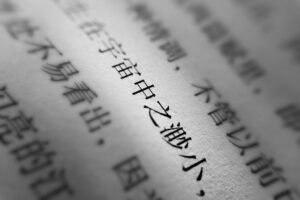Mandarin Chinese is a language rich in nuances, and understanding these subtleties can significantly enhance one’s proficiency. A prime example of this is the phrase ‘除了 (chúle)…以外 (yǐwài)’, a unique linguistic structure used for expressing both inclusion and exclusion. This article will explore the intricacies of ‘除了…以外’, examining its grammatical composition, meanings, and practical usage.
Table of Contents
ToggleDecoding ‘除了…以外’
The phrase ‘除了…以外’ is a combination of two parts: ‘除了 (chúle)’, which means ‘besides’ or ‘apart from’, and ‘以外 (yǐwài)’, meaning ‘outside of’ or ‘other than’. They form a structure that can signify inclusion or exclusion, contingent on the context and the sentence’s construction.
Inclusion vs. Exclusion
Inclusion: When ‘除了…以外’ is used with ‘还 (hái)’ or ‘也 (yě)’ (meaning ‘also’ or ‘too’), it implies the inclusion of the item mentioned after ‘除了’. This conveys that other elements are also involved in addition to the said element.
除了足球以外,我还喜欢篮球。 (Chúle zúqiú yǐwài, wǒ hái xǐhuān lánqiú.) – Apart from football, I also like basketball.”
This sentence includes both football and basketball in the speaker’s interests.
Exclusion: Without ‘还 (hái)’ or ‘也 (yě)’, ‘除了…以外’ tends to exclude the element mentioned after ‘除了’, emphasizing what follows ‘以外’.
除了足球以外,我喜欢篮球。 (Chúle zúqiú yǐwài, wǒ xǐhuān lánqiú.) – Apart from football, I like basketball.
Here, the focus is on basketball, excluding football from the speaker’s interest.
Practical Applications and Examples
‘除了…以外’ is a versatile phrase used in both formal and informal Mandarin contexts. Here are illustrative examples:
Inclusion Example:
除了中文以外,他还会说英文和法文。 (Chúle zhōngwén yǐwài, tā hái huì shuō yīngwén hé fǎwén.)- Besides Chinese, he can also speak English and French.
The sentence includes Chinese, English, and French as languages the person can speak.
Exclusion Example:
除了苹果以外,我都喜欢吃所有的水果。 (Chúle píngguǒ yǐwài, wǒ dōu xǐhuān chī suǒyǒu de shuǐguǒ.) – Apart from apples, I like to eat all kinds of fruits.
Apples are excluded from the fruits the speaker likes.
Avoiding Common Mistakes
- Redundancy: It’s important not to use ‘以外 (yǐwài)’ without ‘除了 (chúle)’. The phrase requires both parts to convey its full meaning.
- Placement of ‘还 (hái)’ or ‘也 (yě)’: The inclusion or exclusion heavily depends on the placement of these words in the sentence.
- Confusing with Similar Structures: ‘除了…以外’ should not be confused with structures like ‘不但…而且 (búdàn…érqiě)’, which means ‘not only…but also’. They serve different purposes and are used in distinct contexts.
Conclusion
Understanding and correctly using ‘除了…以外 (chúle…yǐwài)’ showcases the complexity and richness of Mandarin Chinese. This phrase offers a nuanced way to articulate inclusion and exclusion, thereby enhancing the precision and expressiveness of communication. Mastery of ‘除了…以外’ is a significant step towards achieving greater fluency in Mandarin.
FAQ
Q1: What does ‘除了…以外’ mean in Mandarin?
A1: ‘除了…以外’ (chúle…yǐwài) is a phrase used to express inclusion or exclusion in Mandarin. ‘除了 (chúle)’ means ‘besides’ or ‘apart from’, and ‘以外 (yǐwài)’ translates to ‘outside of’ or ‘other than’. Together, they can indicate either including or excluding the mentioned elements, depending on the sentence context.
Q2: How do you use ‘除了…以外’ to imply inclusion?
A2: To imply inclusion with ‘除了…以外’, you add ‘还 (hái)’ or ‘也 (yě)’ after it. This structure suggests that in addition to the element mentioned after ‘除了’, other elements are also included. For example, “除了足球以外,我还喜欢篮球 (Chúle zúqiú yǐwài, wǒ hái xǐhuān lánqiú)” means “Apart from football, I also like basketball.”
Q3: How is ‘除了…以外’ used to express exclusion?
A3: To express exclusion with ‘除了…以外’, omit ‘还 (hái)’ or ‘也 (yě)’. This emphasizes the elements following ‘以外’, excluding the ones mentioned after ‘除了’. For example, “除了足球以外,我喜欢篮球 (Chúle zúqiú yǐwài, wǒ xǐhuān lánqiú)” translates to “Apart from football, I like basketball,” excluding football from the speaker’s interests.
Q4: Can you give an example of ‘除了…以外’ in a sentence?
A4: Certainly! “除了苹果以外,我都喜欢吃所有的水果 (Chúle píngguǒ yǐwài, wǒ dōu xǐhuān chī suǒyǒu de shuǐguǒ)” means “Apart from apples, I like to eat all kinds of fruits.” Here, apples are excluded from the fruits the speaker likes.
Q5: Is ‘除了…以外’ used in both formal and informal Mandarin?
A5: Yes, ‘除了…以外’ is versatile and can be used in both formal and informal contexts in Mandarin Chinese, making it a useful phrase to know for various situations.
Contact our head teacher, Chen Huimin, at info@lcchineseschool.com if you want to learn Chinese or have additional questions about our Chinese programs.
Sign up for a free trial class here.
Learn about our Internship Program in China.
Get free Chinese learning resources.
Learn about China’s 2024 Offical Holiday Schedule








